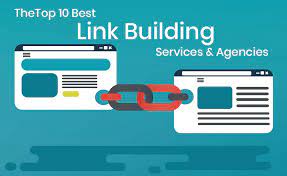Link Building Strategies: Boost Your Website’s Authority and Visibility
In the world of search engine optimization (SEO), link building is an essential strategy to improve your website’s authority and visibility. By acquiring high-quality backlinks from reputable sources, you can increase your website’s organic rankings on search engine results pages (SERPs) and drive targeted traffic to your site. In this article, we will explore effective link building strategies that can help you achieve these goals.
- Create High-Quality Content: The foundation of any successful link building campaign is creating valuable and informative content that others would want to link to. By producing high-quality articles, blog posts, infographics, or videos, you increase the chances of other websites linking back to your content naturally.
- Guest Blogging: Reach out to authoritative websites in your industry and offer to write guest posts for them. This not only allows you to showcase your expertise but also gives you an opportunity to include a link back to your website within the author bio or body of the article. Ensure that the websites you approach have a strong reputation and are relevant to your niche.
- Broken Link Building: Identify broken links on relevant websites in your industry and offer alternative content from your own website as a replacement. This strategy provides value to website owners by helping them fix broken links while gaining a valuable backlink for yourself.
- Influencer Outreach: Connect with influencers in your industry and build relationships with them. Engage with their content, share their posts, and provide insightful comments on their blogs or social media platforms. Over time, they may be willing to mention or link back to your website, boosting its credibility.
- Resource Link Building: Create comprehensive resource pages or guides on topics related to your industry. These resources should provide valuable information and references for readers. Reach out to other websites or bloggers who might find these resources useful and ask if they would consider linking back to your page.
- Social Media Engagement: Leverage the power of social media platforms to build relationships and acquire links. Share your content on social media channels, engage with industry influencers, and participate in relevant discussions. This can lead to increased visibility and opportunities for others to link back to your website.
- Local Citations: If you have a local business, ensure that your website is listed accurately in online directories and review platforms. This not only helps potential customers find you but also improves your website’s visibility in local search results.
- Internal Linking: Don’t overlook the importance of internal linking within your own website. By strategically linking relevant pages together, you can improve user experience, guide search engine crawlers, and distribute link equity throughout your site.
Remember, quality is more important than quantity when it comes to link building. Focus on acquiring links from authoritative websites with a strong reputation rather than pursuing spammy or low-quality links that could harm your SEO efforts.
Implementing these link building strategies requires time, effort, and patience. It’s crucial to monitor and analyze the results regularly to identify what works best for your website and make necessary adjustments along the way.
In conclusion, link building is a vital component of any successful SEO strategy. By employing effective link building techniques such as creating high-quality content, guest blogging, broken link building, influencer outreach, resource link building, social media engagement, local citations, and internal linking – you can enhance your website’s authority, visibility, and ultimately drive more organic traffic to your site.
Common Questions About Link Building Strategies: Explained
- What are the three types of link building?
- What are linking strategies?
- What are the key elements of a successful link building strategy?
- Which link building strategy works best in 2023?
What are the three types of link building?
The three types of link building are:
- Natural Link Building: Natural link building refers to the process of acquiring backlinks organically, without any direct effort or intervention from the website owner. These links are earned naturally when other websites find your content valuable and decide to link to it. Natural link building often occurs when you create high-quality content that others want to reference or share with their audience.
- Manual Link Building: Manual link building involves actively reaching out to other website owners or webmasters and requesting them to include a link to your website. This can be done through various methods such as guest blogging, influencer outreach, broken link building, resource link building, and social media engagement. Manual link building requires proactive efforts and personalized outreach to secure backlinks from relevant and authoritative sources.
- Self-Created Link Building: Self-created link building involves creating backlinks yourself without relying on external sources or interactions with other website owners. This type of link building includes activities like forum signatures, blog comments, directory submissions, and social bookmarking. However, it’s important to note that self-created links are generally considered less valuable by search engines compared to natural or manual links.
It’s crucial to focus on natural and manual link building strategies as they tend to yield higher-quality backlinks from reputable sources. These types of links not only enhance your website’s authority but also provide value to users and improve your overall SEO efforts.
What are linking strategies?
Linking strategies, also known as link building strategies, refer to the various techniques and approaches used to acquire backlinks from external websites to your own website. These strategies aim to improve your website’s authority, visibility, and search engine rankings.
Backlinks are hyperlinks that direct users from one website to another. They serve as a vote of confidence from one website to another, indicating that the linked-to website is reputable and valuable. Search engines like Google consider backlinks as a key factor in determining a website’s credibility and relevance.
Effective linking strategies involve acquiring high-quality backlinks from authoritative websites within your industry or niche. Here are some common linking strategies:
- Content Creation: Producing high-quality and valuable content on your website can naturally attract links from other websites. When you create informative articles, blog posts, infographics, or videos that offer unique insights or solutions, other websites may link to your content as a reference.
- Guest Blogging: Writing guest posts for authoritative websites in your industry allows you to showcase your expertise while including a link back to your own website within the author bio or body of the article. This strategy helps you gain exposure to a wider audience and acquire relevant backlinks.
- Broken Link Building: Identifying broken links on relevant websites and offering alternative content from your own website as a replacement can be an effective strategy. By helping webmasters fix broken links while gaining a valuable backlink for yourself, you provide value to both parties involved.
- Influencer Outreach: Building relationships with influencers in your industry can lead to them mentioning or linking back to your website. Engaging with their content, sharing their posts, and providing insightful comments can help establish connections that may result in valuable backlinks.
- Resource Link Building: Creating comprehensive resource pages or guides related to your industry can attract links from other websites looking for useful references for their readers. Reaching out to these websites and suggesting that they link to your resource can generate relevant backlinks.
- Social Media Engagement: Actively participating in social media platforms, sharing your content, engaging with industry influencers, and joining relevant discussions can increase the visibility of your website. This increased exposure can lead to others linking back to your website.
- Internal Linking: Linking relevant pages within your own website helps guide search engine crawlers, improve user experience, and distribute link equity throughout your site. Strategic internal linking enhances the overall structure and navigation of your website.
It’s important to note that quality is more important than quantity when it comes to link building. Acquiring backlinks from reputable and authoritative websites is crucial for long-term success, while spammy or low-quality links can harm your SEO efforts.
Successful linking strategies require time, effort, and continuous monitoring to adapt to changes in search engine algorithms and industry trends. Regular analysis of the results helps identify what works best for your website and allows for necessary adjustments along the way.
What are the key elements of a successful link building strategy?
A successful link building strategy comprises several key elements that work together to improve your website’s authority and visibility. Here are the essential components:
- High-Quality Content: Creating valuable and informative content is the foundation of any successful link building strategy. When you produce high-quality articles, blog posts, infographics, or videos, other websites are more likely to link back to your content naturally.
- Relevance: It’s crucial to focus on acquiring links from websites that are relevant to your industry or niche. Links from authoritative and related sources carry more weight and provide greater value in terms of SEO.
- Authority: Seek links from authoritative websites with a strong reputation in your industry. These sites have a higher domain authority and can significantly impact your website’s credibility and rankings.
- Natural Link Acquisition: Aim for organic link acquisition rather than resorting to spammy or manipulative tactics. Natural links are earned through the quality of your content and relationships built with others in your industry.
- Diverse Link Profile: Building a diverse portfolio of backlinks is essential for a successful strategy. Aim for a mix of different types of links, such as guest blogging, resource pages, social media mentions, citations, and more.
- Outreach and Relationship Building: Actively reach out to other website owners or influencers in your industry to establish connections and build relationships. Engaging with their content, offering valuable insights, and collaborating on projects can lead to natural link opportunities.
- Analyzing Competitors: Analyze the link profiles of your competitors to identify potential opportunities for acquiring similar links. Look for websites that have linked to them but not to you and consider reaching out to those sources.
- Consistency: Link building is an ongoing process that requires consistent effort over time. It’s important to regularly create new content, engage with others in your industry, monitor backlinks, and adapt your strategy based on results.
- Monitoring and Analysis: Keep track of your link building efforts and monitor the impact on your website’s rankings, traffic, and conversions. Analyze the data to identify what strategies are working well and make adjustments as needed.
- Quality Over Quantity: Focus on acquiring high-quality links from reputable sources rather than pursuing a large number of low-quality links. Quality links have a more significant impact on your website’s authority and rankings.
By incorporating these key elements into your link building strategy, you can enhance your website’s visibility, authority, and organic rankings while establishing valuable connections within your industry.
Which link building strategy works best in 2023?
The best link building strategy in 2023 is one that focuses on creating high-quality content and building relationships with other websites. This includes guest blogging, creating infographics, and using social media to promote your content. Additionally, it’s important to focus on earning links from authoritative sites, as well as building relationships with influencers in your industry. Finally, it’s essential to keep an eye on the latest SEO trends and algorithm updates to ensure your link building efforts remain effective.






